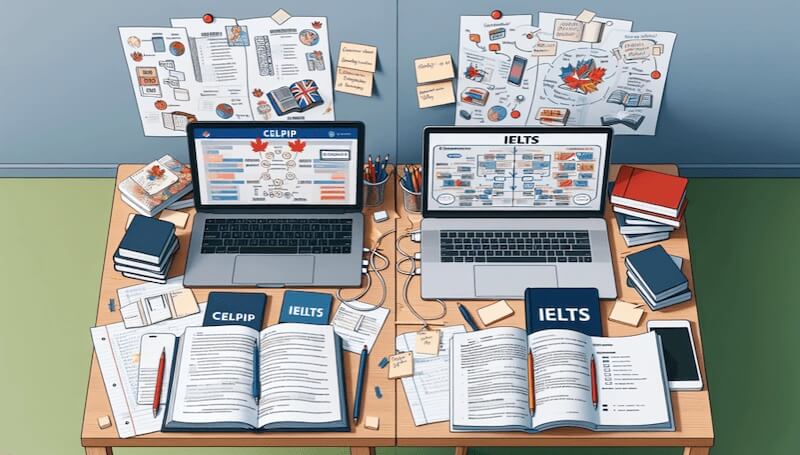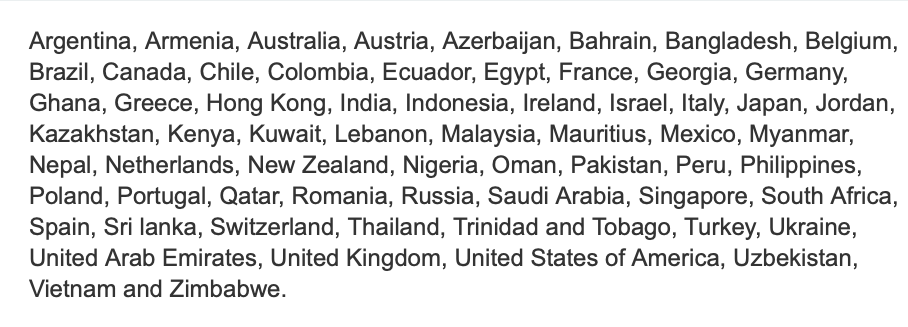Common Mistakes in the IELTS Test & How to Avoid Them
Let's dive straight into the common mistakes in the IELTS test and ways you can avoid them. To do this we'll look at:
- Errors often committed during the preparation process
- Mistakes during the actual sitting of the test
By becoming familiar with these common errors, you increase your chances of achieving an exceptional score.
Mistakes to Avoid in Preparation for the Test
Preparing last minute
One of the most prevalent mistakes is beginning your study process too late. Many candidates underestimate the breadth of the IELTS test and overestimate their academic English level. Delayed preparation can lead to inadequate knowledge and lack of practice, which often leads to poor test results.
How to Avoid It
- Start your revision as soon as possible. Give yourself ample time to study all the required modules, practice sample questions, and familiarise yourself with the exam format.
Assuming you don't need to prepare
Some candidates assume that because their English level is ok or even excellent, they don't need to prepare for the test at all! This is a mistake. There are many errors that even very good or fluent speakers of English can make.
For instance, not having an 'overview' for academic writing task 1 would cost you dearly as it would limit your writing task achievement score to band 5. And the reading tests are difficult even for those the most proficient in English. Even if you are clearly excellent in speaking, not saying enough in the speaking test could limit your score.
How to Avoid It
- Even if you are very good at English, go through some practice tests and check out important test tips for all the modules.
Lacking familiarity with different English accents
The listening section isn't just the classic British accent. There can be various accents, including the variations in regional accents from within the UK, to other European countries, the US, Canada and Australia. Some test-takers struggle to understand if they haven't prepared by listening to a range of accents.
How to avoid it
- Make sure your preparation includes listening to a variety of accents. This can be from any sources, but some of the past Cambridge practice tests include differing accents, so they can be useful for preparing.
Underestimating the importance of vocabulary
Vocabulary plays a significant role in all sections of the IELTS exam. Neglecting vocabulary development can hinder performance in the reading, writing, and speaking sections.
For example, the reading is complex in the academic test so if you don't have sufficient knowledge of vocabulary you won't understand it and will answer questions incorrectly. The examiner also looks out for your vocabulary use in the speaking and writing.
How to avoid it
- Take steps to include vocabulary learning as part of your preparation. For example, read a variety of materials, including newspapers, magazines, articles, and books; keep a vocabulary journal or use digital tools to create lists of new words; explore word families (words derived from a common root) to expand your vocabulary efficiently; start learning the academic word list and topic related vocabulary.
Lack of practice in real-time conditions
This is another mistake candidates make. Studying the material is essential, but so is adapting to the exam's time limitations and pressure. Writing a top-level graph/letter and essay in 1 hour is no easy feat and neither is completing all the sections of the difficult reading test.
How to avoid it
- To avoid this common mistake in the IELTS test, conduct self-tests in an environment that simulates the real exam conditions. Time your practice sessions and maintain a strict adherence to the test duration. Practice and take timed mock tests and get a band score.
Memorising Answers
An over-reliance on memorising answers and information is a common error and can detrimentally impact comprehension ability during the exam. Question types and topics can come up again and again but the way they are worded changes.
In the speaking section, memorised answers often result in unnatural, robotic answers that don't truly answer the given questions.
How to avoid it
- Focus on understanding concepts, improving vocabulary, and enhancing language skills instead of mere memorisation. In speaking, provide spontaneous, well-thought-out responses. It's fine to take a moment to gather your thoughts before responding.
- Regularly look at and practice common question types and topics for the writing and speaking but remember that if you are lucky enough to get a topic come up you have practiced, it's likely the wording of the question will vary and you'll need to adapt your answer from what you have practiced.
Ignoring practice tests
Not taking enough practice tests is another common mistake in the IELTS test. Regularly practicing with sample tests will help you familiarise with the format and improve your test-taking skills as you'll discover where you are going wrong and where to develop your skills further.
How to avoid it
- Search out practice tests such as those you can find here on IELTS buddy (which are designed to closely match those of the real tests) or purchase genuine Cambridge IELTS Practice Tests which are old tests.
Focusing too much on test skills
It's obviously important to understand the test and do practice tests, but you should not do this at the expense of simply improving your general language capabilities. This is particularly important for those who are weaker in English.
Ultimately, IELTS is an English test. If you are poor at English, you are not going to do really well in the test just because you practice it a lot! This might seem obvious but many test takers don't seem to realise this.
How to avoid it
- To avoid this common mistake in the IELTS test, especially if you have weak English, don't become obsessed with test skills. Just focus on improving your general English in whichever ways you can. Doing better at the test will improve naturally as your English skills improve.
Mistakes to Avoid When Sitting the Test
Not reading instructions carefully
Not reading instructions carefully is a common mistake in the IELTS test. Misunderstanding instructions can lead to incorrect answers, no matter how well you've prepared. You could lose points in whole sections of the test if you have not followed what you were told do do.
How to avoid it
- Doing practice tests will show you the kinds of instructions you need to be careful to follow. Take a few minutes to thoroughly read and understand all instructions before beginning the test/each section. Do not rush.
Spending too much time on complex questions
Some candidates spend too much time on complex questions that they don't understand (e.g. some reading questions), leaving inadequate time for the remainder of the test. This mistake can lead to a rushed and insufficiently thought-out completion of the remaining test sections.
How to avoid it
- Keep track of the time. If a question proves particularly challenging, move on and return to it later if time permits and guess if you really do not know.
Overusing complex vocabulary and grammar
Using less common vocabulary and complex grammatical structures are important for a higher score. However, using overly complex words and vocabulary without a clear understanding of their meaning or appropriate context within which to use them can actually end up reducing your score due to errors.
How to avoid it
- Work to improve your vocabulary and grammar as you prepare for the test, but stick with what you are confident with on the day rather than throwing in lots of complex words and grammar that you don't really know how to use properly.
Overusing or not using transition words
Transition words and phrases help to make your speaking or writing more coherent. That said, while some candidates may overuse lots of simple connectors (e.g. first, second, for example, however), making you sound a bit robotic and mechanical, others may not use them at all, meaning the examiner can get confused or lost when they listen to you or look at your writing.
How to avoid it
- Aim for a good balance. Use them sparingly and make sure they are not all overly simplistic but ensure you are using them enough so that an examiner can follow you coherently.
Not using the listening test's checking time carefully
Some candidates don't make good use of the listening test's 10-minute transfer time or the time given between sections, thinking it's unnecessary. This time is crucial for rechecking your responses and ensuring they're written correctly on the answer sheet.
How to avoid it
- Use the 10-minute transfer time wisely to check your answers for spelling or other errors. In the time given between sections, check your answers or if you don't think you need to do this, use the time to look carefully at the next section so you are fully prepared for that.
Not answering the question or going off topic
It's common for candidates in the writing to feel they have to start writing as soon as possible and pay all their attention to language proficiency. This shouldn't be done at the expense of actually answering the question properly, and risking going off topic. The same goes for speaking, with candidates not listening very carefully to the question or not understanding it and going off topic.
How to avoid it
- In the writing ensure you spend a small amount of time at the beginning analysing the essay question, making sure you fully understand it and don't miss anything out when you answer.
- In the speaking, listen very carefully to the question you are being asked. In part 3 where the questions can be more difficult, ask the examiner to repeat it if you are unsure - doing so won't reduce your score.
Leaving out data or having no 'overview' in Academic Task 1
Another common mistake in the IELTS test is not mentioning the data in the graphs at all or having no 'overview' (or having a poor one). These are bad mistakes as doing either of them will limit your task achievement score to a band 5 or worse.
How to avoid it
- Ensure you refer to the data of whichever graph or chart you are given. You don't have to refer to the data constantly but reference should be made to it at relevant points so your description makes sense and is understandable. Have a clear overview. These points are explained in our Task 1 Lessons and Tips.
Being too anxious
Lastly, also among the common mistakes in the IELTS test is anxiety, which can severely impact performance. Worry and stress can hinder your ability to think clearly and accurately respond to questions.
How to avoid it
- Manage your stress and anxiety through breathing exercises, mindfulness, and adequate preparation. Arriving early at the test centre can also help to calm your nerves. Check out what to do the night before the test.
Summing Up
Remember, no exam is without challenges, but thorough preparation and awareness of these common mistakes in the IELTS test you can significantly improve your IELTS performance. With ample practice, a clear understanding of the exam format, and a mind free of anxiety, you'll be well on your way to acing the IELTS test.
Good luck in your preparation and remember that every challenge is a stepping stone towards your success.
Comments
Any comments or questions about this page or about IELTS? Post them here. Your email will not be published or shared.
Band 7+ eBooks
"I think these eBooks are FANTASTIC!!! I know that's not academic language, but it's the truth!"
Linda, from Italy, Scored Band 7.5



























